YET UNHEARD
YET UNHEARD
Music by emerging and established black composers
Wed 25 November 2020, 7.30pm
Online
Recorded Wednesday 17 April 2019 at 7.30pm,
Queen Elizabeth Hall
Richard Ayres No 50 (The Garden)
(2019; UK Premiere of a London Sinfonietta co-commission)
Geoffrey Paterson conductor
Joshua Bloom bass
Martha Colburn visual artist
Sound Intermedia sound and visual projection
Tony Simpson lighting designer
Sophie Motley staging director
London Sinfonietta
Film edited by Martha Colburn
Thank you for watching this stream of No 50 (The Garden).
It’s a pleasure to present another highly individual work by Richard Ayres, after having last performed his In the Alps some years ago. This UK premiere of No 50 (The Garden), performed with the talents of Joshua Bloom, Geoffrey Paterson and animations by Martha Colburn, comes after our performance of the work at the opening night of Zagreb’s Music Biennale in Croatia on 6 April.
This new work is one of the final pieces we are presenting to mark our 50th anniversary. We are grateful to Asko|Schönberg in Amsterdam, and to The Royal Opera who invested in its early development. The work represents our on-going commitment to commissioning and performing new music, alongside our other priorities of supporting the education and lives of individuals and communities through their creation and performance of music and developing talent in composers and the players for the sector. We believe the arts, and new music in particular, has a hugely positive role to play in our society.
We are grateful to Arts Council England and to those who play the lottery for their investment in our work. This support underpins our organisation (as it does for many others across the UK), and enables us to raise and earn more money to deliver a meaningful programme for audiences, composers, players and communities. The London Sinfonietta has shown years of this resilience – more than matching public investment with other self-generated income. This success is not least because of the financial support from individuals – some of whom have invested in this work tonight – and who also invest in other commissions, our projects and performances. If you could consider joining that group, it would be very important to us.
Enjoy the concert.
Andrew Burke
Chief Executive and Artistic Director
A LONDON SINFONIETTA CO-COMMISSION (2018)
No 50 (The Garden) was commissioned by London Sinfonietta and Asko|Schönberg with initial development funded by The Royal Opera. Inspired by Dante’s Divine Comedy, Ayres also drew on texts by Edgar Allen Poe, Christina Rossetti, William Shakespeare and Giacomo Leopardi to create a theatrical work in a similar vein to his highly popular earlier work No 42 (In the Alps) (2008).
The piece is a darkly comic, cyclical tale about a discontented man in search of meaning. He digs from his garden down towards the centre of the earth to find the underworld, then all the way back up again to heaven, only to find himself in his garden once more.
Sampled electronics feature heavily throughout the piece, in keeping with Ayres’ current fascination with electronic sounds as heard in recent works such as No 48 (night studio) (2015) and No 51 (resting songs) (2017).
“The bass will sing the voices of all the characters during the performance, as though singing to himself. This confuses the certainty of reality, and creates the impression of listening to the central character’s thoughts. Are we as an audience watching reality, or observing a dream and fantasy world? Is the man in fact awake, asleep or even dead? This I want to keep ambiguous.” – Richard Ayres
© Schott Music
The piece is in three parts, beginning in the man’s garden where he begins to dig, gradually getting deeper towards hell. Encountering various characters including a worm, a wangee and the lovers from Dante’s Inferno, the 14th century epic poem, the man begins his eventful journey of discovery before changing direction and venturing upwards.
The man sits under an apple tree when something lands on his head. After investigating what fell, he climbs the tree and meets a bird. He continues to climb into the air, getting caught by an airplane and a missile. Moving through the clouds, he travels on an asteroid to see the sunrise, and finally ends up back in his garden. But all of this happens in reverse.
The final section is an interview with an ancient bacterium. The bacterium, having been around since the Earth formed, talks about the development of the world from a new perspective.
It was superbly performed, with the solo bass Joshua Bloom playing all the roles with virtuoso flair... and the Sinfonietta expertly teasing out the densest tangles under conductor Geoffrey Paterson. The Guardian
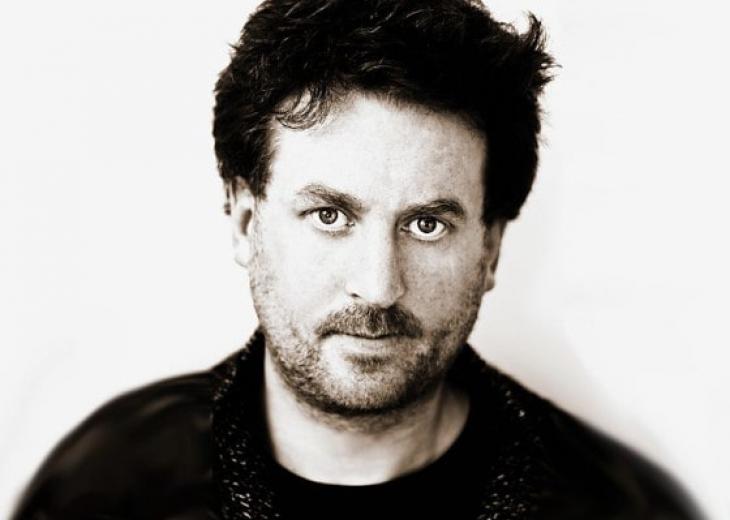
Richard Ayres was born in Cornwall. In 1986 he followed Morton Feldman’s classes at the Darmstadt and Dartington summer schools, and studied composition, electronic music and trombone and Huddersfield Polytechnic, graduating with Distinction in 1989. He moved to The Hague for postgraduate study in composition with Andriessen at the Royal Conservatoire and settled permanently in The Netherlands.
In 1994, Ayres was awarded the International Gaudeamus Prize for composition during the Gaudeamus Music week; hand he received the Vermeulen Prize in 2003, the highest award for a composition in the Netherlands. The same year he was Featured Composer at the Huddersfield Festival. Since 2006 he has taught at the Amsterdam Conservatoire.
Ayre’s orchestral works and series of ‘NONcertos’ for solo instrument and ensemble/orchestra have been performed throughout Europe. They present a kaleidoscope of colour, emotion and musical style, often involving strong visual and dramatic ideas and each bearing a number as its title. No 37b (2006) for orchestra was premiered at the Donaueschingen Musiktage by the SWR Sinfonieorchester Freiburg and Baden-Baden, and has more recently been performed by Frankfurt Radio Orchestra, BBC Scottish Symphony Orchestra and BBC National Orchestra of Wales. No 46 (2010-11) for orchestra was premiered in the 2011 Holland Festival by the Residentie Orkest under Reinbert de Leeuw and repeated the following year; Ilan Volkov also conducted the work in Strasbourg and Glasgow.
Jointly commissioned by BBC Radio 3 and Südwestrundfunk, No 48 (night studio) (2014-15) for orchestra premiered in London with the BBC Symphony Orchestra under Ilan Volkov, and received its European premiere with SWR Sinfonieorchester and Peter Eötvös at the Donaueschinger Musiktage 2015. Klangforum Wien premiered No 31 (NONcerto for trumpet and ensemble) in 1998, which was awarded a recommendation; at the 1999 Unesco Rostrum of Composers in Paris. No 36 (NONcerto for horn and ensemble) (2002) was premiered by the ASKO Ensemble and has since been performed across Europe, notably by Stefan Dohr and the Berlin Philharmonic under Sir Simon Rattle in 2016.
No 42 (In the Alps) (2008), an animated concert written for soprano Barbara Hannigan and the Netherlands Blazers Ensemble, uses narrative projections in the style of a silent film. Regular performances have been given around Europe and the USA. No 30 (NONcerto for orchestra, soprano and cello) (2001-3) was premiered by the CBSO at the Aldeburgh Festival and has since received performances in Russia, the Czech Republic and the Netherlands. More recently Ayres’ No 51 (resting songs) (2017) for mezzo-soprano and ensemble, commissioned for the University of Birmingham’s CrossCurrents Festival, premiered in February 2018 at the Elgar Concert Hall, Birmingham.
Ayres’ first opera, The Cricket Recovers, based on a story by children’s author Toon Tellegen, was commissioned and premiered by Aldeburgh Almeida Opera in 2005, followed by a series of productions at the Brengenzer Festspiele, Staatsoper Stuttgart, the Holland Festival and Theater Basel. His second opera, Peter Pan, was premiered in 2013 by Staatsoper Stuttgart. A revised version was presented by Welsh National Opera in 2015 and by Komische Oper Berlin in 2016/17. Asko|Schönberg presented the world premiere of No 50 (The Garden) with Joshua Bloom in September 2018, followed by a performance in Zagreb and the UK premiere in April 2019. Summer 2019 saw the world premiere of No 49 (context studies) for Ensemble Schwerpunkt in Stuttgart.
A commission from Canada’s Continuum Ensemble allowed Ayres to explore film music through collaboration with renowned film maker Guy Maddin. The resulting work, No 43 (Glorious) (2008) was premiered as part of the SHIFT Festival in Amsterdam and received performances at the Huddersfield Festival and in Montreal, Canada.
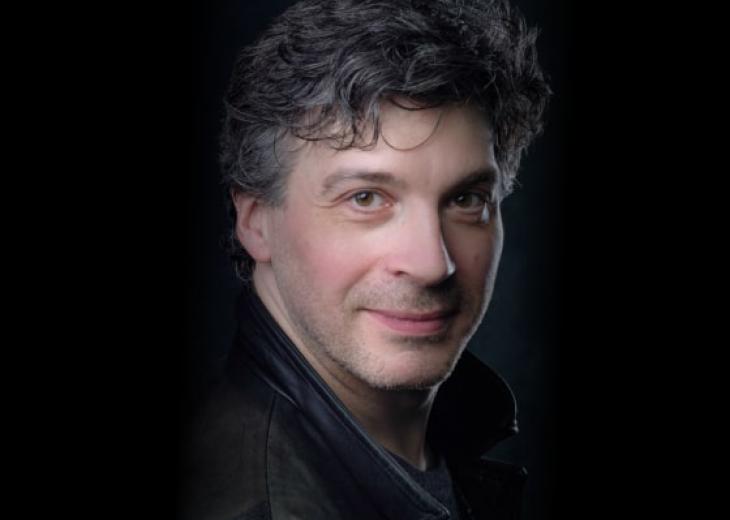
Australian/American bass Joshua Bloom has sung principal roles with San Francisco Opera, Wiener Staatsoper, LA Opera, Opera Australia, New York's Metropolitan Opera, Washington National Opera, English National Opera, Oper Köln, Garsington Opera, Sate Fe Opera, Badisches Staatstheater, Irish National Opera and New Israeli Opera, among others.
He has also appeared on the concert stage with the Berlin Philharmonic, New York Philharmonic, all of the major London orchestras, the City of Birmingham Symphony Orchestra, Britten Sinfonia, the Auckland Philharmonia and the Birmingham Contemporary Music Group as well as the Melbourne, Queensland, Adelaide and Western Australian Symphonies.
Recent highlights include Méphistophélès in Berlioz La damnation de Faust, under the baton of Edward Gardner; role debuts as Bottom A Midsummer Night's Dream with English National Opera in the iconic Robert Carsen production; Faraone in Rossini's virtuosic Mosè in Egitto, directed by Lotte de Beet; title role in Bartók's Bluebeard's Castle, in a new production by Enda Walsh and Kaspar Der Freischütz.
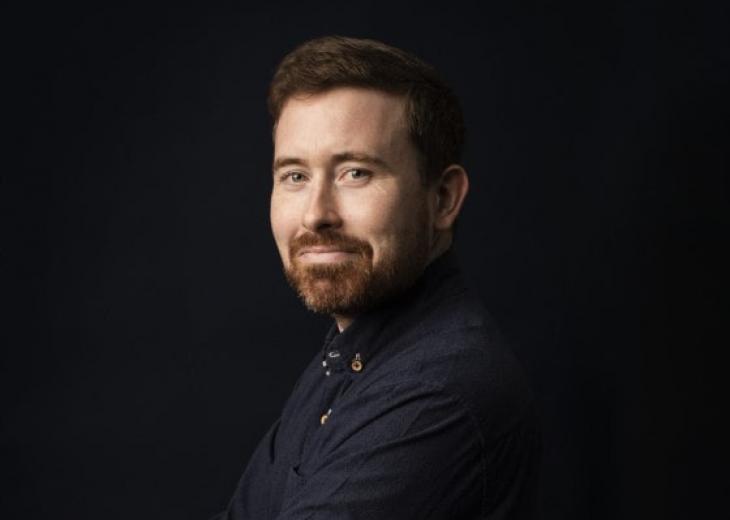
British conductor Geoffrey Paterson is admired for his impressive grasp of detail, responsiveness to musicians, and his ability to shape and make music from the most complex scores with natural authority.
Plans in 20/21 include a streamed BBC Prom from the Royal Albert Hall with the London Sinfonietta (whom he conducts regularly) and appearances with the BBC National Orchestra of Wales, Royal Liverpool Philharmonic, Orchestra of the Age of Enlightenment, Copenhagen Philharmonic, Nash and Asko Schoenberg ensembles. Recent highlights have included appearances with the Philharmonia Orchestra, Danish National Symphony Orchestra, Aurora Orchestra, Orchestre National de Lille, National Orchestra of Belgium, Basel Sinfonietta, BBC Scottish Symphony Orchestra and Scottish Chamber Orchestra.
Geoffrey studied at Cambridge University where he also took composition lessons with Alexander Goehr followed by studies at the Royal Scottish Academy of Music and Drama. Having won both First Prize and the Audience Prize at the 2009 Leeds Conductors Competition, he went on to participate in the Luzern Festival conducting masterclasses with Pierre Boulez. During his time on the Royal Opera House Young Artist Programme he assisted conductors including Antonio Pappano, Mark Elder, Andris Nelsons and Daniele Gatti on an extensive repertoire. For two seasons he worked in Bayreuth as musical assistant to Kirill Petrenko for Der Ring des Nibelungen.
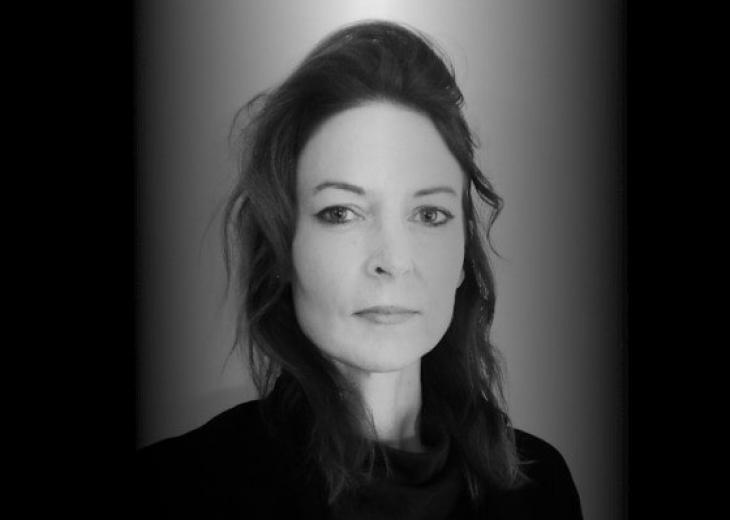
Born in rural Pennsylvania, Martha Colburn is an artist filmmaker based in Pennsylvania, USA and Amsterdam, the Netherlands. She travels extensively exhibiting and lecturing on her work. She has a B.A. from Maryland Institute College of Art and MA equivalent from Rijksakademie Van Beeldende Kunst in the Netherlands.
In the 2007 Sundance Film Festival she was invited to initiate the ‘New Frontiers’ film and video installation program, with ‘Meet Me In Wichita” and in 2008 to opened the Museum of Art and Design (NY) with a live performance of films and music. In 2010 two of her films joined the collection of the Museum of Modern Art in New York and the Philadelphia Museum of Art.
Song text by the composer – incorporating words by Dante, Leopardi, Shakespeare, Poe, Rossetti and others. Projected text in italics.
'Digging the garden calms the spirit,
and leads one towards a sober and quiet mind'
'Shrubbery; seeming and being'
Laura Kant, 1967
His house feels crowded again…
Hot summer night.
Looking out of the window.
Far in the distance, the town still clacks and rumbles.
Neighbours are doing neighbour things.
He looks around and thinks…
Man:
What a mess…
Man absent-mindedly hums and whistles.
Afternoon
The sun is shining
Exhausted plants lower their heads
In the garden
He digs his usual hole
The hole:
A vertical shaft,
Far deeper than the roots of the apple tree,
Leads to a chamber that is,
In some areas,
Voluminous enough to sit upright,
But in other places more of a comfortable wriggle.
The central tunnel extends far under the road,
Under the school,
Far under that small grove of trees on the left.
Truthfully,
He has no real idea how deep or how far he has travelled,
And is not going to start thinking about it now.
The hole is never warm or cold…
…sounds are neither loud not truly silent…
He likes the smell of timeless soil.
Alone,
In mother earth…
…he can sometimes manage to forget who he is.
He can curl up and start all over again.
In the deepest chamber
He can finally stretch out and relax.
Alone.
Darkness and peace.
The presence.
Man calls out into the darkness. A sinister worm-voice echoes a reply.
Man:
Out the lights all out.
A crawling shape intrudes
A blood – red thing that writhes
Worm!
After our lonesome later years
Then we become your food.
Worm:
Then you become my food.
Man:
Then we become its food. Ah
Worm:
Ah
Man:
Life is a tragedy called man.
And its hero the conqueror worm.
Worm:
Earth worms have no eyes, but we can see the light.
Dead skunks, dead voles, dead bears, dead moles,
Dead cat, dead rat, dead gnat, dead bat,
Dead lice on mice, dead eel, dead seal,
Dead goat, dead fox, dead stoat, dead frog, dead dog, dead moth, dead sloth, dead…
Dead orange, dead...
Dead...
Dead...
Earth worms have no eyes, but we can see the light.
Dead lions, dead lambs, dead men!
All end up in our shite!
Man:
After our lonesome later years
Then we become your food.
Life is a tragedy called man.
And its hero the conqueror worm.
I do solemnly and sincerely declare that:
I, Worm (henceforth known as Wrm.); or,
A member of my immediate family; or,
A member of my household,
Will not eat him yet.
Wrm.
Worm:
Ah
Man:
Ah
Worm:
It’s Midekapp the lightning worm!
Dig!
Safe again,
the man and worm stretch out and relax.
Man:
What’s that?
Worm:
It’s a soldier
Man:
It’s a ghost
The ghost soldier
Corporal Sallow of the 7th Fusiliers,
Two and a half metres tall with his hat on,
Died on October 12th 1748, and…
…was eaten by worms.
Soldier:
Again the advance of armies
Noiseless in the mists and vapours
From our graves ascending.
I am dead, my dearest,
Sing no sad songs for me.
Plant thou no roses at my head,
Nor shady cypress tree.
I chant this chant of my silent soul,
In the name of all dead soldiers,
Ghosts of the countless dead.
I see not my shadows,
I feel not the rain;
Haply I may remember.
And haply may forget.
And dreaming through the twilight
That doth not rise or set,
Haply I may remember,
Haply may forget.
I am dead my dearest
Sing no sad songs for me.
Man:
What’s that noise?
Soldier:
Voles
Worm:
Dig, quickly, dig!
Safe again,
The man, worm and soldier stretch out and relax.
They all decide to travel together, and to dig deeper and deeper.
Worm:
Don’t look back.
Soldier:
Behind you it’s black.
Worm:
Don’t look behind,
Soldier:
Behind.
Worm:
Come with us,
Come with us.
Soldier:
Come with us.
Worm:
And you will find
Man:
Don’t look back,
Worm:
And come with
Soldier:
Us.
Man:
What’s that noise?
Soldier:
Basilisks hunting.
Worm:
Shhhh!
Basilisk:
Basilisks
Sibilant sisters
Seeking searching
Sifting, snooping
Surreptitiously stalking
Soundless
Pursuit
Basilisks
Sibilant sisters
Sotto voce scavengers
Scheming conspiring deceptive desiring
Serial oppressors
Embracing devouring
Soldier, worm and man meet a fossil.
The fossil;
A mono-lunged,
Rainbow in colour,
62cm in diameter.
Died 1,270,200,000,000 hours ago
Enjoyed shallow warm water,
and dappled sunlight.
Now has a heart of stone.
Fifteen questions for a fossil.
Worm:
What’s your name?
Soldier:
Where are you from?
Worm:
What do you do?
Soldier:
What’s your star sign?
Worm:
Are you married?
Soldier:
What’s your favourite tree?
Man:
But do you love?
Do you sigh?
Does your heart ever fly,
Or go tickety tok
Tickety tok tok
Tickety tok
But do you love?
Worm:
Do you have children?
Solider:
Are you an introvert, or an extrovert?
Worm:
Left wing or right wing?
Soldier:
Wine, beer or whisky?
Worm:
If you could change just one thing…
Soldier:
What would it be?
Man:
But does your soul ever soar,
And your feet leave the floor,
Is it hard to ignore
When your true love comes,
Through the door.
Worm:
Do you dream in colour?
Soldier:
Do you like travelling?
Man:
But do you laugh?
Do you cry?
And do you always know why?
Worm:
Are you spiritual?
Soldier:
Summer, winter or spring?
Worm:
Left or right brain?
Soldier:
Real life or fiction?
Worm:
What most frightens you?
Soldier:
Where will you be in 20 years’ time?
Man:
And do you love?
Do you sigh?
Does your heart ever fly?
Worm:
I smell a Wangee!
Hide!
What’s a Wangee?
Good question.
Man, worm, solider, fossil, and wangee dig further.
Star Echo Pool.
The Star Echo Pool shows us neutrinos.
It was built far underground for that purpose.
Nobody visits anymore…
…and the pool was wondering if it was still showing neutrinos…
…if no-one is looking.
The companions arrive at the edge of the inferno.
Francesca and Paolo are having an awkward conversation.
Francesca:
Paolo
What a rough heart,
Filled with delight and sweetness.
Paolo:
You gentle nymph,
The beauty of all beauty.
Sweetheart of loving senses and sighs.
Francesca:
Paolo!
Paolo:
Lucia?
Francesca:
Paolo, Paolo!
Paolo:
Maria?
Francesca:
Paolo, Paolo, Paolo!
Paolo:
Giulietta?
Heavenly Choir:
Beautiful mother from the choir above,
Come down to us
On wings of gold.
Let our eyes glitter with the silver of stars,
And no longer with the light of infinite flames.
Beautiful mother from the choir above,
Come down to us
On wings of gold.
Let our eyes glitter with the silver of stars,
And no longer with the light of infinite flames.
For Francesca,
‘Forever’ sometimes feels like a very long time.
Francesca:
Paolo
What a rough heart,
Filled with delight and sweetness.
Paolo:
You gentle nymph,
The beauty of all beauty.
A thousand joys grow in my chest.
Francesca:
Paolo!
Paolo:
Beatrice?
Francesca:
Paolo! Paolo!
Paolo:
Luigi?
Francesca:
Paolo! Paolo! Paolo!
Paolo:
Cassandra!
The soldier, the worm,
the fossil, the man, the wangee,
Paolo and Francesca decide to travel further together.
Worm:
Don’t look back.
Basilisk:
Or left or right.
Soldier:
Behind you it’s black.
Basilisk:
And above you as well.
Worm:
Don’t look behind,
Soldier:
Behind.
Worm:
Come with us,
Come with us.
Soldier:
Come with us.
Worm:
And you will find
Basilisk:
Hisss
Man:
Don’t look back,
Worm:
And come with us.
Wangee:
WANGEE…
They see a dark shape approach.
The shape is holding a mandolin.
Inyur-Endo the Goblin Troubadour.
Oh dear.
Inyur-Endo the Goblin Troubadour:
Oh.
Just when she lay there sleeping
Her love came by with his worm with one eye,
And it rained and it rained but not from the sky.
Oh, dilly dong,
Oh dilly dong,
Jolly roger oh, oh.
The brave knight he was dressed in green
His breath smelled of fish and his tongue wasn’t clean,
And his nuts were brown but they wouldn’t fall down.
Worm:
Don’t look back.
Francesca:
Or left or right
Soldier:
Behind you it’s black.
Basilisk:
Or left or right
Soldier:
Behind you it’s black.
Paolo:
Above you as well
Wangee:
WANGEE…
Worm:
Don’t look behind,
Francesca:
Don’t look behind.
Worm:
Come with us,
Come with us.
Soldier:
Come with
Paolo:
Come! Come!
Soldier:
And you will find
Basilisk:
Hisss
Worm:
Don’t look back.
Soldier:
Don’t look back.
Francesca:
Or left or right
Worm:
Don’t look back.
Soldier:
Behind you it’s black.
Paolo:
And above you as well
Soldier:
Behind you it’s black.
Basilisk:
Hisss
Worm:
Don’t look behind,
Wangee:
Wangee!
Worm:
Come with us,
Come with us.
Soldier:
Come with
Francesca:
Come with us!
Worm:
Come with us,
Come with us.
Come with us,
Come with us.
Basilisk:
Come with us…
Paolo:
COME…
Man:
Don’t look back,
And come with us.
He is sitting under the apple tree in the garden, when something falls on his head.
He climbs to the top of the tree to investigate, he talks with a lonely bird, climbs higher,
catches a plane, falls through clouds, catches a missile, falls again, sits on a meteoroid,
sees something amazing, and journeys with the meteoroid back towards the garden.
But today…
… we will hear all this in reverse.
The meteoroid…
…hurtling through space.
If it doesn’t hit any of the 17,852 pieces of junk now orbiting the earth…
…satellite chunks…
…rocket pipes…
…or the desiccated bodies of experimental astronaut dogs and monkeys…
…with terror frozen on their little faces…
…it will eventually land in a suburban garden…
…not far…
…from where you are sitting.
Clutching on to the hurtling meteoroid…
…he began to notice…
…a crescent of light…
…appearing from behind the Earth.
So this…
…he thought…
…is a sunrise.
A sunrise…
A sunrise without tall buildings…
Without the ash clouds…
…without storm turbulence…
…without the billow-dust…
…or the fog of traffic…
…without oxide haze over heated ground.
He is falling,
His eyes closed
His arms flailing wildly…
…And catches hold of something solid.
He opens his eyes, and sees…
He grabs hold of a passing missile.
The bit the missile was looking forward to the most
Was her short stay outside of the Earth’s atmosphere.
She was curious about the lightness and quietness.
She had unexpected company.
He had joined her as she passed through the last cloud bank.
He was holding on to her tightly.
She began to feel out of control…
…even a little bit wild.
She glimpsed other possibilities…
Other futures, far away from Earth.
He is falling, his eyes closed
His arms flailing wildly…
He opens his eyes, and sees…
Clouds…
Clou…
Clouds.
The clouds above the city were usually purple and beige.
He had thought that this was a trick of the light.
From inside the cloud he could see that each tiny droplet was mauve or rust-brown.
What he hadn’t anticipated was the smell…
…the cloud smelled metallic and burned the inside of his nose.
He is falling, his eyes closed
His arms flailing wildly…
…and catches hold of something solid.
He opens his eyes, and sees…
From the highest branch of the tree he decides to climb even higher.
‘Atoms are everywhere. In ladders, but also in air…’
‘So it should be possible,’ He thought.
He closes his eyes…
…reaches upwards…
…and climbs…
It is strenuous…
He thinks progress is probably slow.
The bird and the man are sitting on the top branch of the tree
The bird sings…
The man translates…
Man:
If you hear singing
It will be only me.
It will be only me.
It will be only me.
In this garden I’m alone.
In this garden I’m alone.
So few of us left,
And so much noise.
So few of us left,
So few of us left,
And so much noise.
And so much noise.
If I don’t sing loudly,
no other bird will hear.
So few of us left,
And so much noise.
And when I get lonely
I call to myself from another tree.
If you hear singing
It will be only me.
And so much noise.
He was sitting under the apple tree in the garden.
And he heard…
And he heard…
And he heard…
Something small and green-grey-brown fell upon his head
An apple.
That got him thinking.
Why did the apple fall?
‘Silly question’, he muttered…
Why wouldn’t it fall??
He was hungry…
…And decided to climb the tree and look for more apples.
Did the apple think about the centuries of suicidal self-sacrifice that other apples had endured attempting to communicate their greatest discover…gravity…?
No.
Some time afterwards…
In the garden…
…it was a good time for…
…cyanobacteria.
The factories had stopped buzzing and clanking.
The town in the distance didn’t hum.
The traffic was still.
The plants were no longer green.
The apple tree had lost its remaining leaves.
Nothing moved,
Not even an insect,
Not even air.
Silence screamed.
An interview with an ancient bacterium.
The Interviewer:
This small piece of the planet has been occupied for three and a half billion years by your family.
Ancient Bacterium:
Yes.
The Interviewer:
What do you think of recent events?
Ancient Bacterium:
Oh, it has happened many times before.
The Interviewer:
Are you glad that they have all gone?
Ancient Bacterium:
Yes.
Yes.
I always preferred the quiet times.
The Interviewer:
Lah lah lah lah lah lah.
The Interviewer:
Are you curious about the future?
Ancient Bacterium:
No.
It comes along and goes again.
The Interviewer:
You have a family song, that you sing to help you remember who you are.
Ancient Bacterium:
Yes, with two new lines at the end.
First came water…
…Then came fire.
Then came water…
…Then came fire.
We just carried on.
Then came water…
…Then we made air!
Then came ice…
…Then came fire.
We just carried on.
Then came water…
…Then came crawling…
…Then came four legs…
…Then they were gone.
Then came two legs…
…Now they are gone.
Then came two legs…
…Now they are gone.
Ancient Bacterium:
First came water,
Then came fire.
Then came water,
Then came fire.
We just carried on.
Then came water.
Then we made air!
Then came ice,
Then came fire.
We just carried on.
Then came water,
Then came crawling,
Then came four legs,
Then they were gone.
Then came two legs,
Now they are gone.
Then came two legs,
Now they are gone.
END
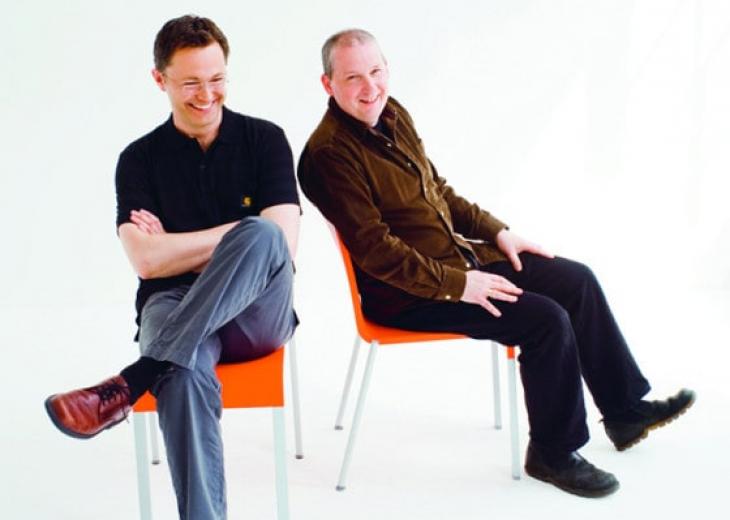
Launched in 1996 by Ian Dearden and David Sheppard, Sound Intermedia revels in the challenge of bringing new work to its audience. Renowned for sophisticated sound designs for live events, they have worked in concert halls and opera houses around the world, collaborating with many of the preeminent creators and performers of new music of the last 70 years.
Their experience is sought when exceptional events go beyond established paradigms. They have devised and curated installations and performances in museums, art galleries and a myriad of unusual spaces around the world - from Venice Beach California to Aldeburgh beach in Suffolk; from the tunnels of London Underground to helicopters over Paris.
Their aim is to motivate and influence musicians, technicians and composers through authoritative performance and to pass on their ingenuity to the next generation, better to serve the music of the future.
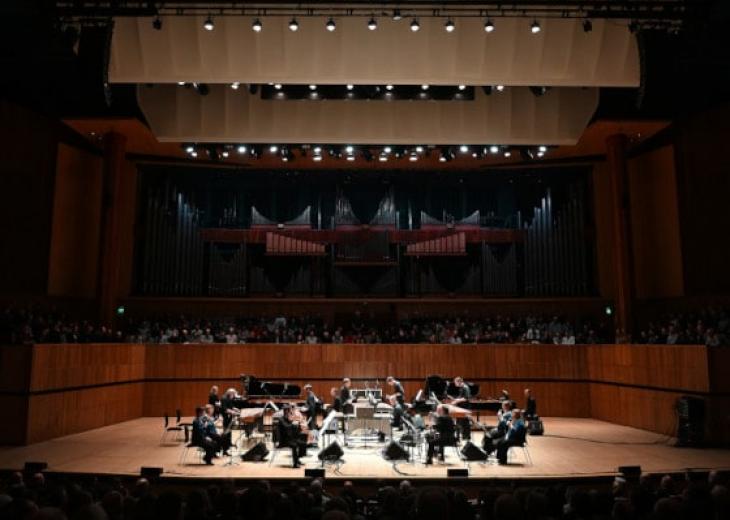
The London Sinfonietta is one of the world’s leading contemporary music ensembles. Formed in 1968, our commitment to making new music has seen us commission over 400 words and premiere many hundreds more.
Our ethos today is to constantly experiment with the art form, working with the best composers and performers and collaborating with artists from alternative genres and disciplines. We are committed to challenging perceptions, provoking new possibilities and stretching our audiences’ imaginations, often working closely with them as creators, performers and curators of the events we stage.
Resident at Southbank Centre and Artistic Associate at Kings Place, with a busy touring schedule across the UK and abroad, the London Sinfonietta’s core 18 Principal Players are some of the finest musicians in the world. Holding a leading position in education work, we believe that arts participation is transformational to individuals and communities, and that new music is relevant to all our lives.
This belief is enacted through primary and secondary school concerts across the UK, interactive family events, and the annual London Sinfonietta Academy; an unparalleled opportunity for young performers and conductors to train with our Principal Players. The London Sinfonietta has also broken new ground by creating Steve Reich’s Clapping Music App for iPhone, iPad and iPod Touch, a participatory rhythm game that has been downloaded over 300,000 times worldwide.
Recent recordings include George Benjamin’s opera Into the Little Hill (Nimbus; 2017), Benet Casablancas’ The Art of Ensemble (Sony Classical; 2018), David Lang’s Writing on Water (Cantaloupe Music; 2018) and Philip Venables’ debut album Below the Belt (NMC; 2018).
Karen Jones flute/piccolo
Fiona Cross clarinet
Scott Lygate bass/contrabass clarinet
John Orford bassoon*
Michael Thompson horn*
Christian Barraclough trumpet
Byron Fulcher euphonium*
Simon Blendis violin
Elizabeth Wexler violin
Lynda Houghton double bass
Rolf Hind keyboard
Owen Gunnell percussion
Simon Hendry visuals operation for Sound Intermedia
Alice Maughan sound operation for Sound Intermedia
*London Sinfonietta principal player (see above for more information)